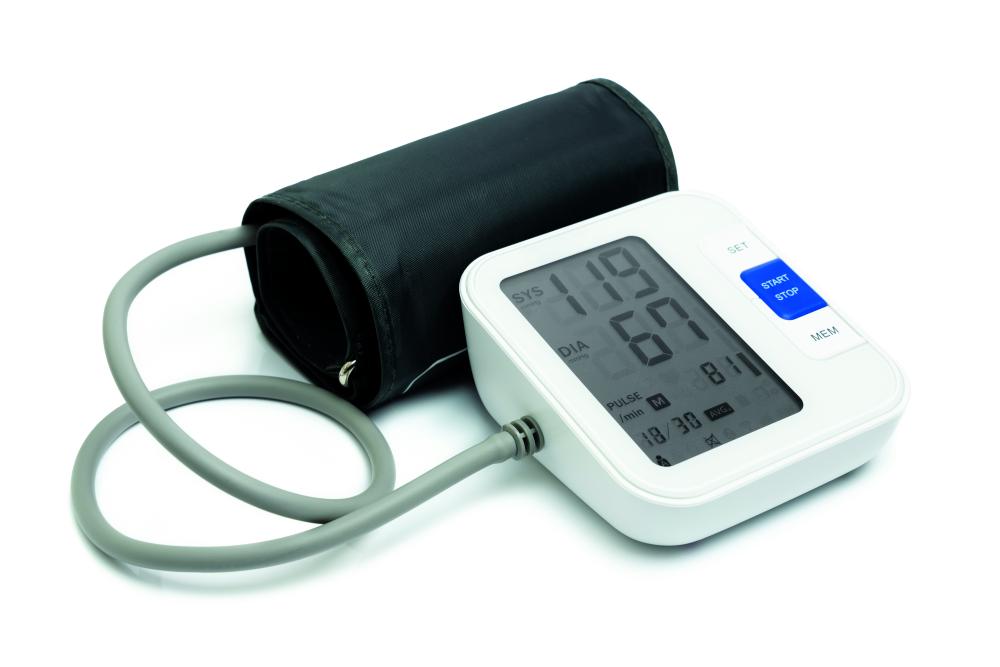Sparking Change 'From the Kids Up'

Sangeeta Shah, M.D., a VCU Health Pauley Heart Center cardiologist, works with Hopewell elementary school student Gi’Shiya Broggin in April as part of Pauley’s Teach BP program. Photo: Tyler Trumbo, MCV Foundation
A VCU Health Pauley Heart Center program is teaching elementary students how to measure blood pressure and educate their families about heart health.
By Nicole van Esselstyn
Jim White paused in the middle of a buzzing, crowded elementary school room in Richmond’s Church Hill, remembering that five decades earlier he attended Armstrong High School five blocks away. Now, after a successful career that included a stint in New York City, he’s back in Richmond with tears in his eyes.
He’s looking at fourth- and fifth-graders who remind him of his younger self and hoping they will experience less loss and greater opportunities than he did.
White, 79, is at Anna Julia Cooper School for Teach BP’s family night. A VCU Health Pauley Heart Center program, Teach BP launched in 2022 at the Richmond East End school as a way to reach multigenerational populations with lifesaving information about hypertension. The program outfits students with information to educate family members and become changemakers in their communities.
During family night, students were the teachers, showing parents and caregivers how they could take blood pressure readings and explaining the impact on overall health. They’d been equipped with the knowledge thanks to Teach BP’s curriculum, taught in part by VCU students in the schools of Medicine, Pharmacy and Education.
“It was an impactful moment,” said White, who was diagnosed with high blood pressure in his 20s after graduating from Virginia Union University. Receiving early intervention preserved his health — but many of his own family and friends were not so lucky. “I hoped that those kids would have an easier track to go on than I did. While I was proud and excited of what was happening, I couldn’t help but wonder how many more people in this community would still be alive or in better health today if this program had started many years ago.”
Common ground to change the health of a community
As a Pauley board member, White generously supports the heart center through his time and gifts to programs like Teach BP, which got its start through philanthropic support and continues to rely on private funding. In addition to Richmond’s East End, the program has expanded to Hopewell.
I couldn’t help but wonder how many more people in this community would still be alive or in better health today if this program had started many years ago.
Jim White, member, VCU Health Pauley Heart Center Advisory Board
High blood pressure and cardiovascular events are prevalent in these communities, where life expectancy is significantly lower than neighboring areas — sometimes by as much as 20 years. Hopewell’s leading cause of death is heart disease, a condition that most often starts with hypertension.
Melody Hackney, Ed.D., superintendent of Hopewell City Public Schools, said she’s thrilled to have Teach BP’s curriculum bring much-needed health education and prevention to a younger generation.
 “We have a high percentage of poverty as well as nutritional and health gaps in our community,” said Dr. Hackney, who has lived and worked in Hopewell for eight years. “When you are trying to change entrenched behaviors, you do it from the kids up and not the adults down. This program feels like we can make a difference in an almost monumental and insurmountable challenge.”
“We have a high percentage of poverty as well as nutritional and health gaps in our community,” said Dr. Hackney, who has lived and worked in Hopewell for eight years. “When you are trying to change entrenched behaviors, you do it from the kids up and not the adults down. This program feels like we can make a difference in an almost monumental and insurmountable challenge.”
Started by Pauley cardiologist Sangeeta Shah, M.D., Teach BP is modeled after a program she developed for Girl Scouts in New Orleans. Knowing the positive impact of that program, Dr. Shah was eager to bring a similar experience to Richmond’s youth.
“The beauty of this program is its simplicity,” said Dr. Shah, an associate professor in the School of Medicine’s Division of Cardiology. “Every parent, caregiver or grandparent has been to a school, so why not use that common ground to change the health of a community? It just makes sense. Stats show that children can change the health care of their families.”
Partnerships with like-minded organizations have helped buoy Teach BP to keep it sustainable and growing. Earlier this year, the MCV Foundation approved a grant for the program. The American Heart Association is also an official sponsor, providing blood pressure devices and cuffs for the program’s curriculum. The AHA recently accepted Dr. Shah’s research abstract on the success of Teach BP’s first year in Anna Julia Cooper School.
“We are addressing generational consequences and challenges here, and our children are innocently affected by that,” Dr. Hackney said. “Even though we are known for saying that there is ‘hope in the well,’ we still need help, and we are grateful for the partnerships that are coming alongside us to make a difference.”
White agrees on the need for generational intervention and the desire for lasting change. His dream would be a Teach BP program in every elementary school across the country: “Imagine what a difference that would make.”
Editor’s Note: This story originally appeared in the summer 2023 issue of NEXT magazine. Our online version includes more stories about innovative research happening on the MCV Campus.
To support the VCU Health Pauley Heart Center’s Teach BP program, please contact Sarah Neely, associate director of development, at 804-628-8908 or sarah.neely@vcuhealth.org.
Healthier for All
View more stories on our ongoing series about health equity.